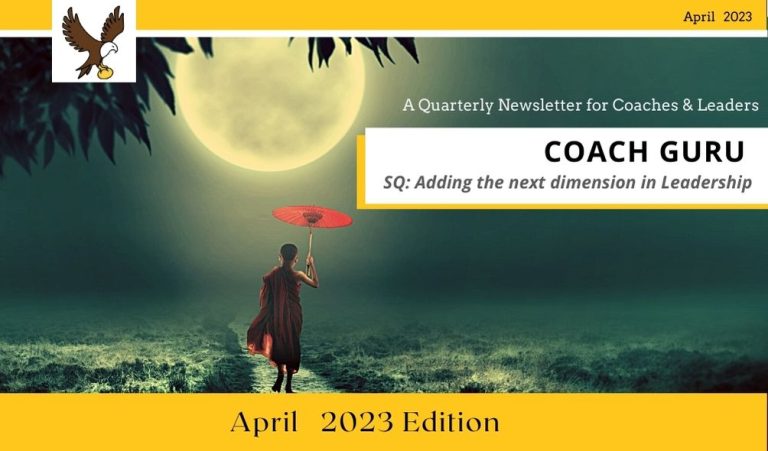As we wound towards the end of a pre-coaching discovery conversation, I asked my prospective client what he knew about coaching and what was he expecting.
“Isn’t it similar to consulting or counselling where we will talk, I will share my challenges, you will share some insights, I will have some solutions and voila, my problems will be solved”
That is when I realized that coaching is a well-known term, and yet what it is, is understood differently by different people. It must have shown on my face
“Why don’t you tell me what it is”, added Sam.
Well Sam, in the true spirit of coaching, where do you want to start?
What is ICF Coaching?
Sam thought for a moment-“Let me see. Can we start with what is this ICF Coaching that you talk about?”
Of course, Sam. Let me start by telling you that coaching is unregulated. Not everyone is a coach though and not everyone who can talk can coach. That is where credentials come in.
Being a coach is an arduous process that involves classroom training, hours and hours of self-reflection, coaching practice, and strict evaluation by ICF before anyone can be credentialed coach.
ICF coaching and credentials, globally recognized as a gold standard in coaching, provides an easy metric for clients to choose qualified and credentialed coaches.
I gave a pause and Sam was ready with his next question.
” I understand that this is an important differentiator, but what exactly does ICF coaching involve?“
Sam, ICF has defined a framework based on a set of competencies which a coach should demonstrate in every coaching conversation. ICF coaching emphasizes partnering as a key foundation of coaching. A coach and the coachee, partner in a non-judgmental way, in an environment of mutual trust, to discover what is uniquely possible for the coachee. And then the partnering continues as the coachee takes action to realize their chosen potential.
7 Common Myths About ICF Coaching:

Misconception no. 1 – A coach gives the Solution
“That is interesting. I was under the impression that as a coach you will give me a solution and all my issues will be resolved” Sam sounded doubtful.
Sam, you are not the only one who confuses ICF coaching with other interventions like consulting or counselling. The similarity is that all these are client-centric. A consultant is a subject matter expert and gives a solution based on their experience and understanding of the industry and the problem. A counsellor advises and presents options based on their knowledge. An ICF coach, however, works with the clients to help them come up with their own answers.
“What does that mean ?” – Sam was quick to ask.
What this means is that ICF coaching believes that a client is complete and for their unique aspirations and challenges, they are the best suited to come up with solutions that work for them.
Imagine if you have a problem, and I give you a solution, whose solution is it? I asked.
“You are giving the solution, isn’t it obvious”- Sam looked at me funnily.
“Of course, it is my solution, it is not yours.” I said and let that stand for a moment. I could see Sam’s eyes glowing as he suddenly became aware of the simplicity behind the ICF coaching framework.
Misconception no. 2- A coach needs to be a subject matter expert
Sam was thinking deeply as he said, “I never thought in this way, Mani. I think I need to reset my thinking on coaching. I wonder what other misconceptions in my mind about coaching are. I always used to think that a coach needs to be a subject matter expert”
Well, as I mentioned Sam, the fundamental belief in ICF coaching is that the client is complete. They know what matters to them, what is bothering them, what is coming in the way, their motivations, beliefs, aspirations, etc. They also know what will work for them uniquely. A coach comes to know about all this through the client themselves. If something matters to the client, they will talk about it. A coach just remains curious.
What do you think matters – knowing about clients and their situation as the clients see them or bringing in expertise that may or may not be the client’s reality?
Sam was cautious. ” It does make sense when you put it like that.”
Misconception no. 3 – A coach will tell me what to discuss
“So, as my coach, you will partner with me to help me find my own solutions which will lead me to my growth personally and professionally”
That’s right.
“But, how will you decide what to discuss in every coaching conversation?”
I don’t decide, I said. Remember what I said about partnering? You choose what to talk about and achieve in a conversation, I partner with you in choosing as well.
“What if I choose wrong? “, blurted Sam.
As we talk and as you realize that you may have chosen wrongly, you can always make another choice. ICF Coaching is all about deeper exploration.
“wow, that sounds like empowerment”, Sam was all smiles.
Myth no. 4 – the coaching conversation will solve all my problems
“So I choose what to bring to the conversation, and by the end of it or maybe in a couple of conversations, I will come up with the answers. Mission accomplished.”
Not so fast Sam. A coaching conversation leads the coache to some discovery, learning, and insight. This learning itself may fizzle out if not applied. A conversation in an ICF coaching session combined with meaningful action(s) between the sessions leads to personal and professional growth.
What is achieved in a coaching conversation is only a part of the puzzle. What is gained by taking the action completes it. ICF coaching begins with goals & concludes with concrete actions.
Myth no. 5 – Coaching will work only over long durations
“oh oh, with this combination of conversations, awareness and action between sessions, it sounds like coaching is a long-term affair. “
Honestly, Sam, there is no simple answer to this. For some it may take time, for others, the results may come faster. A lot depends on the client, the kind of objectives they have, and their current reality. I have seen ICF Coaches weave magic in one session, and I have also witnessed ICF coaching engagements running for years because the client needs it so.
Myth no. 6 – Coaching is expensive
“I get that, but what about the money? Why is coaching so expensive? “
I am glad you asked this, Sam. The question to ask is – expensive compared to what?
When you invest in coaching, you are investing in yourself and your life. Is any price too high if it leads to fulfilment and balance in your life? ICF Coaching is an enabling process. As the focus is on coaching the person, the insights gained, create a multiplier effect. The return on the investment, therefore, is multifold.
“I think that’s where ICF coaching credentials help. Instead of looking at the stock price, it is like looking at the value it can deliver. Am I right?”
You could not have said it better Sam.
Myth no. 7. Coaching is nothing but self-help served by someone else
” I am glad I had this conversation with you. I have one final query – If I know enough about coaching, can’t I coach myself just as people get help from self-help books and videos?“
I chuckled. Even credentialed coaches have coaches, Sam.
To answer your question, You can self-coach
➥ if you are willing to accept yourself the way you are, and be vulnerable
➥ if you believe that you have all the answers and you just need to discover them
➥ if you can aspire and look beyond the constraints
➥ if you know what questions to ask yourself, and
➥ if you have the courage and willingness to ask these questions
➥ if you can give honest answers to yourself
➥ if you can actively listen to these answers without bias
➥ if you can call yourself out when you bluff or are evasive
➥ if you can notice the insights and awareness that emerges
➥ if you can anchor these insights and choose your actions
➥ if you can hold yourself accountable for these actions and the results
➥ if you are not swayed by the hurdles into giving excuses
If you are willing and have the perseverance to do all this hard work by yourself, go for it. Else, get a professional coach.
Sam was speechless for a while. and then he said ” when do we start”
An Executive & Leadership Coaching by REGAL UNLIMITED
Coaching Leaders & Executives has been our passion & inner calling. We groom leaders to shift the orbit (and not mere stretch the goals) We take pride in having an elite community of 300+ trained, certified and qualified ICF Coaches (including the author of this blog – Subramani Balakrishnan) who can hold the space and let new possibilities emerge for the clients. ICF Coaching is the GOLD Standard. And we take pride in being the BEST ICF Coaching provider!
If you are looking for the best Leadership & Executive Coaches to groom you or your leadership teams, then we are a call away.
Are you looking to become a Coach? We train individuals to become certified ICF Coaches.
Write to us to know more: info@regalunlimited.com






